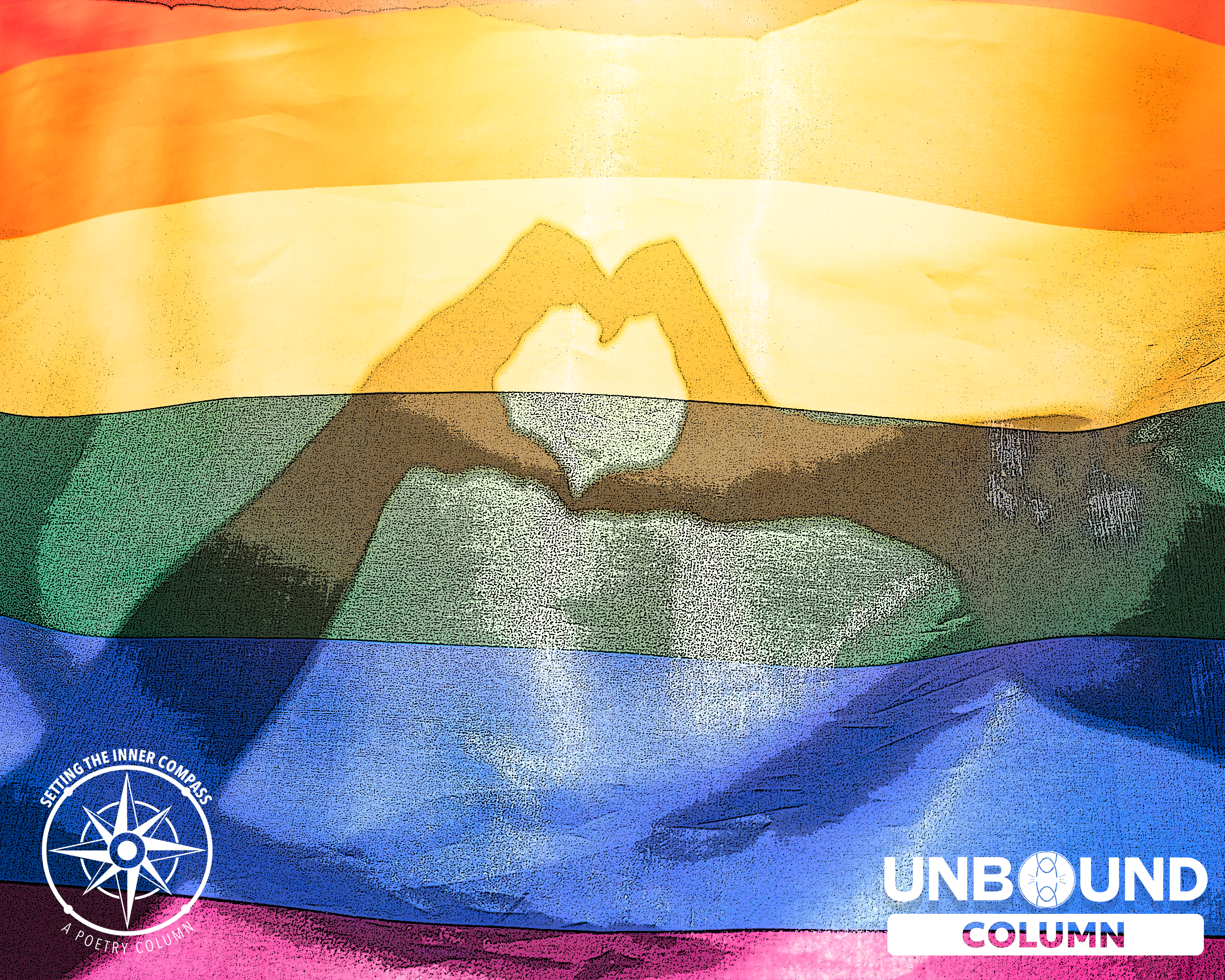Queering Jonah
The narrative logic of the book of Jonah resembles that of a dream, or a surrealist novel. God tells Jonah to get up and go to the city of Nineveh and ‘proclaim against it’. Instead, Jonah flees in the opposite direction and gets on a boat to Tarshish. A storm comes up and all the sailors on the boat pray to their gods to no avail. Finally, Jonah confesses that he might be the problem and they throw him overboard. He is swallowed by a giant fish. While inside the fish, he very poetically praises God and asks to be freed. After three days, the fish spits him out on dry land (conveniently closer to Nineveh). God tells him again to go tell the Ninevites to repent. This time he does as he is told and walks through the city saying, “Forty days, and Nineveh will be turned upside down!” The Ninevites immediately respond to Jonah’s prophecy by repenting, fasting, and donning sackcloth – this includes every member of the community, from the king down to the animals. Because of their repentance, God refrains from destroying Nineveh and the Ninevites. Jonah goes off to rest from his travels (and sulk over the fact that his prophecy worked) some distance away from the city. He builds himself a shelter and is pleased when a plant grows overnight to help give him shade. Then God causes the plant to die, and Jonah complains about it. God delivers the smackdown “if you cared so much about this plant, that only existed for one night and that you didn’t do anything for, how much more should I care about a whole city, including all the people living in it and its cows?”
Jonah is, if not our queerest prophet, then definitely our queerest prophetic book. This short (only 4 chapters!) book sits oddly among the other eleven minor prophets: Jonah is not identified with an Israelite king’s reign and offers only five words (in the Hebrew) of actual prophecy. He is commanded to prophesy to non-Jews, and is astonishingly successful at getting the city of Nineveh to change its ways. And this success, paradoxically, makes him very unhappy. The book of Jonah is in many ways more similar to the books of Job and Esther than it is to other prophetic books in the Hebrew Bible. Like Job, Jonah is disconnected from the major events of Israelite history and the specifics of Israelite practices. Like Esther, there is an exaggerated, almost campy quality to the story of Jonah. It challenges, reverses, or interrogates almost every assumption we have about what a book of prophecy is supposed to be.
The Hebrew Bible is divided into three sections: Torah (the Five Books of Moses), Nevi’im(Prophets), and Ketuvim (Writings). Jonah is one of the twelve minor prophets that make up the latter portion of Nevi’im. In Jewish liturgical practice, when a Torah portion is publicly read on Shabbat and on holidays, it is customary to pair it with a reading from Nevi’im. Jonah is the prophet paired with the Torah reading for Yom Kippur afternoon.
Yom Kippur is the holiest day of the Jewish year. Most Jews spend all or part of the day in synagogue, fasting from food and water. The liturgy focuses on human frailty, repentance and connection with God and community. In that context, the humor and absurdity of the book of Jonah can feel startling, even shocking. Some common explanations for this placement are that the Ninevites are a model for the kind of attitude toward repentance we should all strive for, or that the text is a prime example of how human repentance can activate God’s mercy.
In my eyes Jonah, for all the surrealism of his book, is the most human. He literally runs away from the task set for him by God and holds on to petty resentment in the face of his unparalleled success. What could be more human than fear and petty resentments? If the book of Jonah comes to teach us anything, it might be that we don’t have to be perfect in order to have a profound and positive impact on the world.
And as a queer woman who serves as clergy in a patriarchal and heterocentric tradition that I nonetheless love deeply, Jonah makes sense to me.
I came of age in the 1980s and 90s, when AIDS overwhelmed almost everything else in the queer community. Some of my earliest political memories are of seeing AIDS patients engaged in ‘die-ins’, and ‘when you have unprotected sex with someone you are having sex with everyone they have ever had sex with’ was a lesson I internalized so deeply I couldn’t imagine that anyone else hadn’t.
Many of my earliest role models and mentors were queer women devoted to taking care of the sick and dying queer men in their lives. Or queer women running domestic violence shelters that served mostly women fleeing heterosexual relationships. Even as a baby dyke at the height of Riot Grrrl, I saw queer women’s needs and priorities taking second place to those of men and straight women.
And even as second-wave feminism opened up spaces in Judaism for women to engage and lead in new ways, it took decades more for queer folk to have access to those same opportunities. During that time we developed alternative spaces and rituals and language that met our needs. Now, those spaces and rituals and languages are becoming mainstream in many Jewish spaces, detached from the history and communities that forged them.
If queer folks are prophets, they have most often been Cassandras – shouting warnings at the world that go unheeded. As we were figuring out how to be with other people during the height of the Covid pandemic, the parallels with AIDS prevention were obvious to me. Wearing a mask in 2021 felt as self-evident as using a dental dam or a condom in 1995. It was honestly shocking to me that the queer community’s hard-won knowledge of how we keep each other safe was forgotten or ignored or discarded precisely when it would have been most useful.
Queer women have been part of feminist communities and queer communities since those communities came into being. Within and beyond those communities, many of us have been stalwartly in service of the needs of gay men and straight women. When will it be okay to prioritize ourselves, or for other people to prioritize us?
Last year, a friend and I taught a class called ‘Queering Jewish History.” We focused on the last 50 years, and introduced our (mostly queer, mostly early-20s) students to some of the central innovations and institutions of queer Jewish life in the contemporary world. Most of them had no idea of the richness and complexity of queer community before they were born, and didn’t know the queer origins of Jewish practices they take for granted today. It is hard to see history that I lived through being lost and forgotten.
So I feel Jonah’s pain and anger when, with just five words, the Ninevites turn on a dime and are spared God’s punishment. “Why was it so easy for them?” I imagine him asking. “Why is it harder for me? Why did you have to take away my sheltering vine?”
And I can feel the truth of God’s response – “can’t you, oh human, see beyond your own experience, even for a moment” I resent it, but I feel it.
This is a paradox of queer religious life – when does it get to be our turn? When do we get to be at the center? Or are we destined to always contribute from the margins? Less important than even the cows?

Rabbi Megan Doherty (she/her) is the Senior Educator at HIAS. Previously, she was the Director of Hillel and Campus Jewish Life at Oberlin College, and Associate Rabbi and Senior Jewish Fellow at the Slifka Center for Jewish Life at Yale. She serves on the board of the Reconstructionist Rabbinical Association, and was a founding co-chair of the Reconstructionist Movement’s Joint Israel Commission. Doherty was a member of Cohort VII of the Shalom Hartman Institute Fellowship for Campus Professionals. She holds a certificate in Jewish Mindfulness Meditation from the Institute for Jewish Spirituality and the Awakened Heart Project, and is an alumna of IJS’s Rabbinic Leadership Program. She completed Social Justice Mediation training with the Yeworkwha Belachew Center for Dialogue at Oberlin, and is a certified mediator in the state of Ohio. Doherty has a Bachelor of Arts from The Evergreen State College, and was ordained as a rabbi by the Reconstructionist Rabbinical College.



Unbound Social